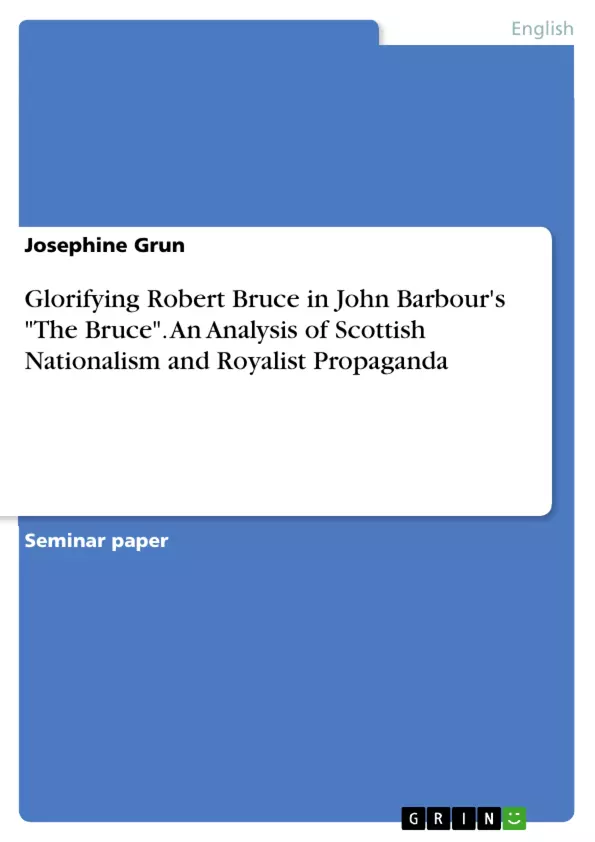This analysis examines John Barbour's "The Bruce," a significant medieval Scottish work, for its portrayal of Scottish nationalism and royalist propaganda. The aim is to explore how Barbour distorts history to reinforce Robert II's position and underscore Scotland's independence.
Written in the 1370s, John Barbour's "The Bruce" is an epic poem narrating Scottish history from 1286 to 1332, with a focus on Robert Bruce's leadership in the First War of Scottish Independence. Though classified as a chronicle, romance, biography, and epic, the work blends historical facts with royalist propaganda. This study argues that "The Bruce" incorporates elements of Scottish royalist propaganda and nationalism to justify and strengthen Robert II's position and Scotland's status as an independent nation. It distorts or omits specific historical events, glorifies the historical figure of Robert Bruce, and emphasizes anti-English sentiments. The analysis is organized into three sections: the portrayal of the succession dilemma and Wars of Independence, the praise of Robert Bruce, and the negative depiction of England.
Inhaltsverzeichnis (Table of Contents)
- Introduction
- Rewriting National History
- Glorification of Robert Bruce
- Anti-English Sentiment
- Conclusion
Zielsetzung und Themenschwerpunkte (Objectives and Key Themes)
This paper aims to explore how John Barbour's The Bruce, a medieval Scottish poem, utilizes elements of Scottish royalist propaganda and nationalism to justify and strengthen the position of Robert II as well as Scotland's status as an independent nation. The paper examines how Barbour's work glorifies Robert Bruce, distorts historical events, and emphasizes anti-English sentiments in order to achieve this goal.
- The use of royalist propaganda in The Bruce to promote Robert II's legacy.
- Barbour's manipulation of historical events to legitimize Robert Bruce's rule.
- The poem's portrayal of English actions as a means of fostering Scottish national identity.
- The significance of The Bruce as a literary expression of Scottish nationalism.
- The influence of historical context on Barbour's narrative choices.
Zusammenfassung der Kapitel (Chapter Summaries)
- Introduction: This chapter introduces The Bruce as a key piece of medieval Scottish literature, highlighting its connection to the Wars of Scottish Independence and its exploration of national identity. The chapter also discusses Barbour's intended purpose for the poem, which is to record Scottish history truthfully while simultaneously glorifying Robert Bruce and promoting Scottish independence.
- Rewriting National History: This chapter explores how Barbour distorts historical events to legitimize Robert Bruce and his descendants. The chapter focuses on Barbour's portrayal of Bruce's early years, his relationship with Edward I, and the succession conflict between Bruce and John Balliol. The chapter argues that Barbour's narrative choices are motivated by a desire to present a stronger and more favorable image of Robert Bruce.
- Glorification of Robert Bruce: This chapter analyzes how Barbour praises Robert Bruce throughout the poem. The chapter examines the ways in which Barbour presents Bruce as a valiant and heroic figure, emphasizing his military skills, his political acumen, and his commitment to Scotland. The chapter explores the impact of this glorification on the poem's overall narrative and its portrayal of Scottish national identity.
- Anti-English Sentiment: This chapter examines the negative portrayal of England and the English in The Bruce. The chapter analyzes how Barbour's work depicts the English as aggressors, oppressors, and a threat to Scottish independence. The chapter considers the significance of this anti-English sentiment in shaping the poem's overall message and its appeal to a Scottish audience.
Schlüsselwörter (Keywords)
The main keywords and focus topics of The Bruce include Scottish nationalism, royalist propaganda, historical distortion, glorification of Robert Bruce, anti-English sentiment, medieval Scottish literature, Wars of Scottish Independence, and national identity.
- Quote paper
- Josephine Grun (Author), 2022, Glorifying Robert Bruce in John Barbour's "The Bruce". An Analysis of Scottish Nationalism and Royalist Propaganda, Munich, GRIN Verlag, https://www.hausarbeiten.de/document/1434181


